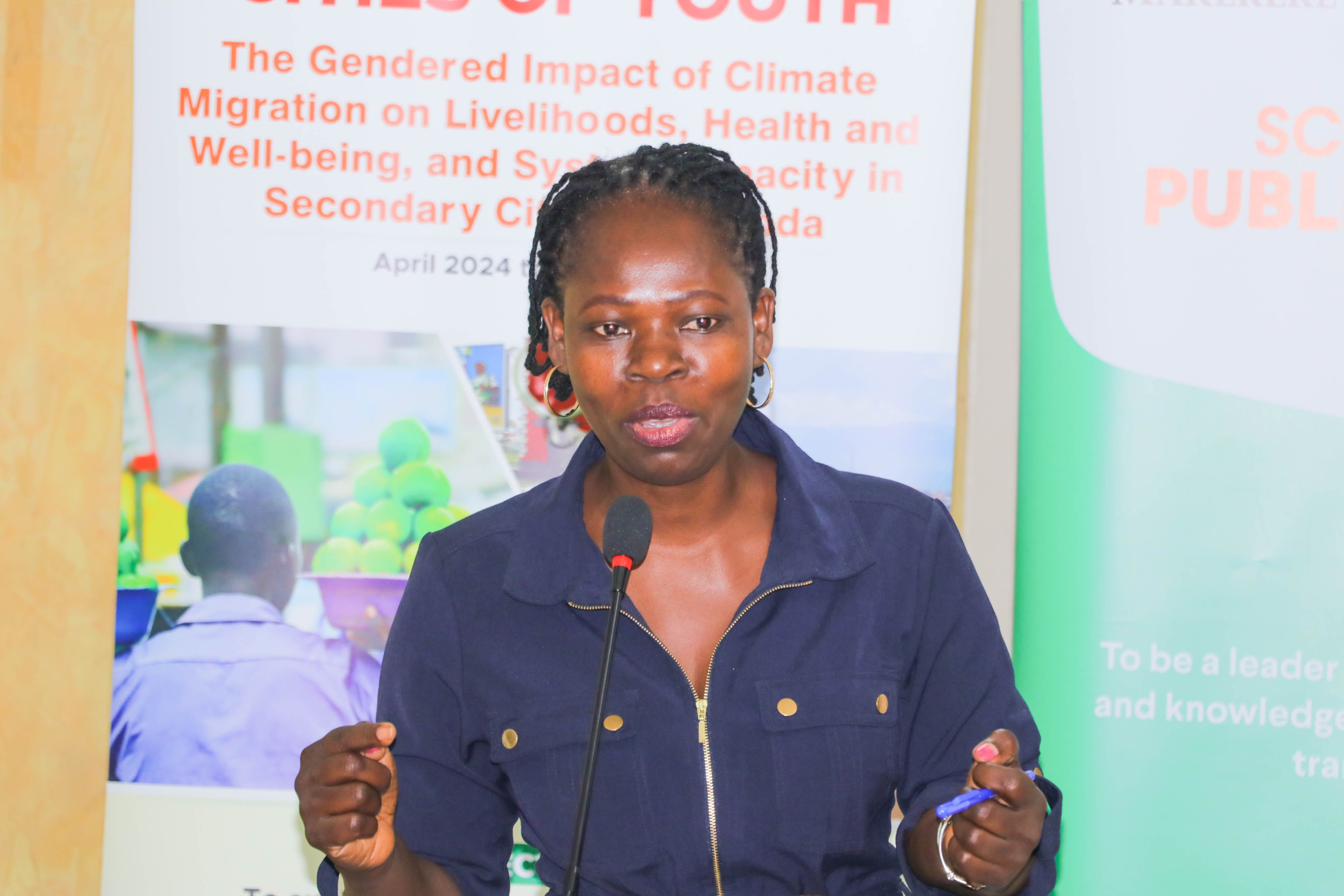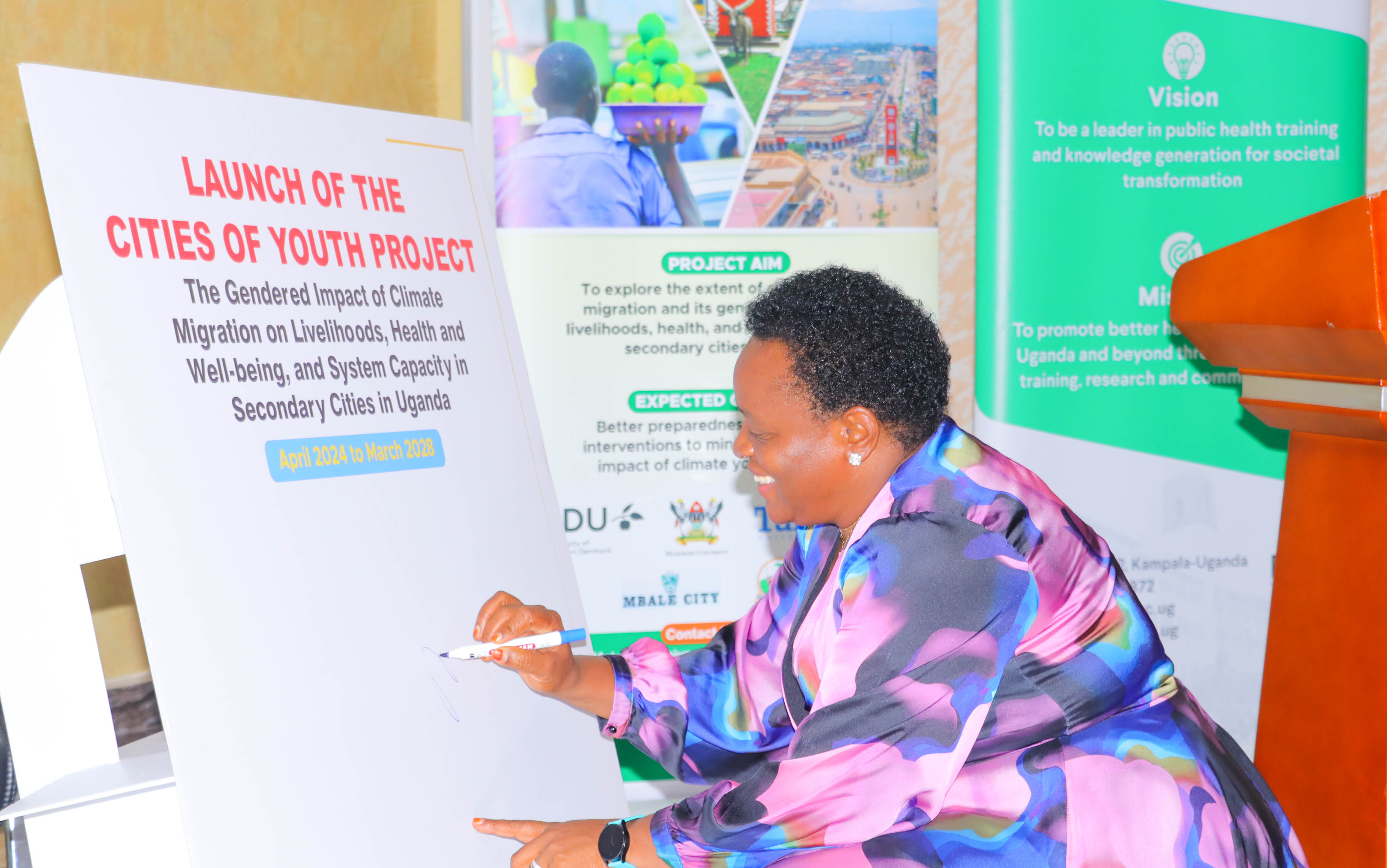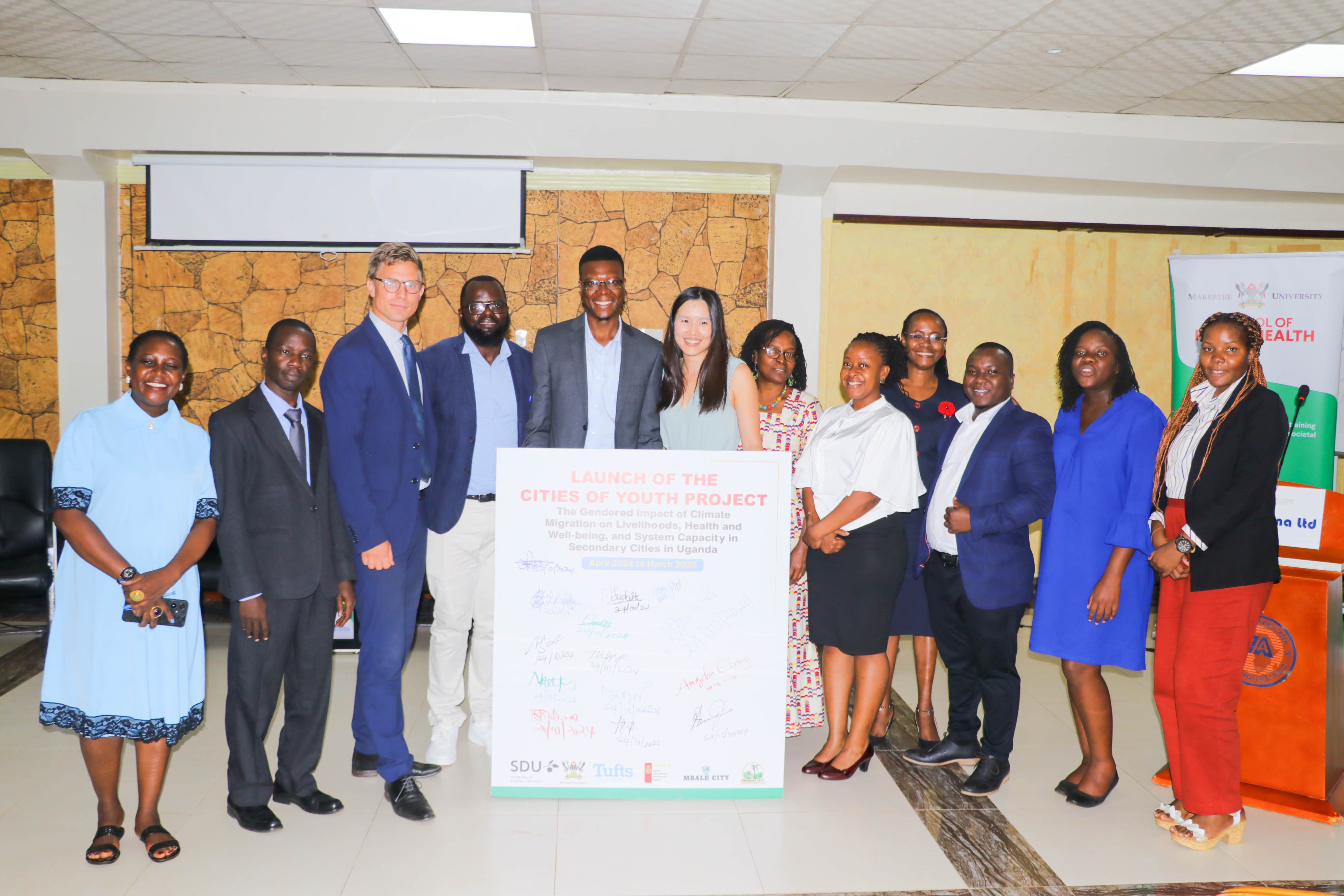
By Okeya John
On October 24, 2024, Makerere University School of Public Health (MakSPH) launched the Cities of Youth Project at Hotel Africana in Kampala, bringing together policymakers, academics, development partners, and community stakeholders to tackle the critical issue of climate-induced migration among youth in Uganda’s secondary cities of Mbale and Mbarara.
The two cities are study sites for the implementation of the Cities of Youth project, which runs between 2024 and 2028. This initiative, also known as The Gendered Impact of Climate Migration on Youth Livelihoods, Health and Well-being, and System Capacity in Secondary Cities in Uganda, is funded by the Danish International Development Agency (DANIDA) and will aid the development of data-driven strategies to mitigate the negative impacts of climate migration with a particular focus on the gendered and health-related challenges in Uganda.
In her welcome remarks, Dr. Joan Mutyooba, Chair of the Department of Epidemiology and Biostatistics, representing Prof. Rhoda Wanyenze, Dean of the Makerere University School of Public Health at the project launch, thanked the partners of the Cities of Youth project for their important collaboration to combat the effects of climate change. She underscored the reality of a warming planet and the resulting shifts in environmental health, noting that;
“A lot of concerted efforts are needed to address this challenge. It calls for a multi-sectoral approach and I want to appreciate this project for its cross-sectoral, collaborative, and capacity-building nature because if we are to have a sustainable future, capacity must be built. At Makerere University School of Public Health, we encourage and have a vision of innovation and adaptability to change. We (MakSPH) value (s) social accountability and social justice, diversity, and inclusion. So, we look forward to a very exciting project that will open doors for additional research and indeed programme shift.”

Key to note, for Uganda, is that climate-induced youth migration is an increasingly pressing concern, with severe floods, droughts, and erratic weather patterns forcing many young people to leave their rural homes. With over 75 per cent of Uganda’s more than 45 million people under the age of 35, increased youth migration is reshaping urban areas in the country, with strained resources, and intensified socio-economic challenges. This shift begs an urgent need for proactive interventions to enhance preparedness and response to the growing trends.
Evidence confirms that the influx of youth into cities in search of better livelihoods and opportunities places immense pressure on already struggling infrastructure, housing, and services, including healthcare. For Uganda’s rapidly growing cities, this migration threatens to destabilize the economy and worsen unemployment and inequality, complicating efforts to achieve sustainable development and social stability in a climate-vulnerable context.
With this context, the Cities of Youth Project comes in to explore the extent of climate youth migration and its gendered impact on livelihoods, health, and system capacity in the two cities in Eastern and Western Uganda, to generate evidence for the intervention to minimize the negative impacts of climate youth migration in the country. Speaking at the project launch, H.E. Adam Sparre Spliid, the Deputy Head of the Danish Mission in Uganda welcomed the Cities of Youth initiative, stating that the project was timely given the current climate change-related challenges.

The Deputy Ambassador highlighted the collaboration between Makerere University in Uganda, the University of Southern Denmark, and Tufts University in the U.S.A. as crucial to addressing climate-related challenges, including climate-induced migration, mentioning that Uganda and Denmark have been long-term collaborative partners in research and education.
“The project comes at a critical moment in Uganda’s history when it comes to climate change, and so, it is timely. We are happy to be a part of it and confident that this project will serve as a model intervention that will inform future initiatives from us and other international partners, to build on to help citizens across Uganda and beyond, respond more effectively to the challenges brought about by climate change.” H.E. Adam Sparre Spliid noted.
The Deputy Ambassador further stated that climate change is a challenge for our generation, recognizing DANIDA and the Danish Government for their long-standing partnership with universities in the developing world. He affirmed that the Cities of Youth project is a testament to such continued commitment, geared towards generating evidence for informed decisions in the race towards climate change mitigation and adaptation to deal with its adverse impacts.
For her part, launching the project, Hon. Peace Regis Mutuuzo, Uganda’s Minister of State for Gender and Culture highlighted the country’s vulnerability to climate change. She observed that the youth in Uganda are currently disproportionately affected by climate change-related hardships like flooding, droughts, and erratic weather, pushing them to the cities and straining the cities already struggling with the socio-economic pressures caused by rapid urbanization.

“By 2050, as many as 12 million Ugandans are projected to migrate internally due to climate-related factors. Migration is not just a population issue, it has a gendered dimension. Female youth migrants face gender risks of harassment and exploitation, while male youth migrants often engage in physically demanding and unsafe jobs. This project’s (Cities of Youth’s) emphasis on understanding these gender-specific impacts is crucial for shaping policies that not only protect but also empower our young people.” The Minister of State intimated.
In Uganda, the Cities of Youth project is led by Dr. Rawlance Ndejjo as Principal Investigator from Makerere University, alongside Co-Investigators Dr. Sarah Ssali, Dr. Charles Ssemugabo, and Dr. Florence Kyoheirwe Muhanguzi from Schools of Public Health and Women and Gender Studies. Internationally, the collaborative initiative includes Dr. Elizabeth Stites and Dr. Kimberly Howe as Co-investigators from Tufts University, USA, while Dr. Angela Chang from the University of Southern Denmark is the overall head for the multi-country project.
The preliminary baseline shared shows that climate change is increasingly driving internal migration in Uganda, as an adaptation strategy by the communities. With over 70 per cent of Uganda’s population heavily reliant on agriculture, it means that harsh climatic conditions force many to migrate. In 2023 alone, approximately 5,000 internal displacements were recorded, while localized floods and landslides displaced around 87,000 people in 2020.

Presenting their plan for Uganda, Dr. Ndejjo and Dr. Kyoheirwe said Mbale and Mbarara receive significant numbers of migrants due to the adverse effects of climate change. Mbale faces an influx from Bududa, Sironko, and Bulambuli due to landslides and floods in the Elgon area, as well as Katakwi, Soroti, Kumi, Moroto, Napak, and Nakapiripirit driven by floods and droughts. The same with Mbarara, migrants mainly come from Isingiro, Kazo, Kiruhura, Ibanda, Ntungamo, Bushenyi, Sheema, Buhweju, Rubirizi, Mitooma, Kanungu, Kabale, Rubanda, Kamwenge, and Kisoro, driven by droughts and floods.
In the two study sites, the project will analyze climate trends and migration patterns to understand how changing weather conditions drive internal movement, examine livelihood transformations focusing on how migration affects the ways youth migrants and host communities sustain themselves, assess health impacts including mental health, psychosocial well-being, and sexual and reproductive health, and further evaluate the effects on critical systems, such as healthcare, water and sanitation, housing, and the broader environment.
Still, as part of its capacity-strengthening activities, the Cities of Youth project is currently supporting our PhD fellows: Ms. Resty Kyomukama Magezi, Ms. Gloria Bahizi, Ms. Donna Keirungi, and Mr. Arnold Tigaiza for their training at Makerere University. The project will also undertake multi-stakeholder engagements at local, regional, and national levels for collaboration and train city teams on climate mitigation, gender, and health.
“I am optimistic that the Cities of Youth Project will generate meaningful insights that will guide our policies and improve the lives of young people across Uganda. Together, we can create a future where our youth are not just survivors of climate change, but active participants in shaping a resilient and sustainable Uganda,” Hon. Mutuuzo affirmed during the launch.

With the activities, the investigators will produce research and policy briefs, reports, and presentations, creating avenues to co-develop recommendations and solutions with stakeholders. Dissemination efforts will include publications and conferences to share their findings and drive informed policy and practice, towards fostering evidence-based, gender-sensitive policies and programmes that address the underlying drivers and patterns of youth climate migration as well as their social and economic impacts.
From the key implementation activities, the other contributions will include promoting positive coping and livelihood strategies to enhance the health and well-being of young climate migrants, ensuring a better match between the demand and supply of health and social services in host cities, and boosting awareness among stakeholders on the needs of migrants and host communities and improving data systems for tracking youth migration, enhance research capabilities within Uganda, and build long-term capacity for early-career researchers, ensuring a sustainable approach to tackling youth climate migration challenges.
At the launch, various stakeholders expressed their support for the Cities of Youth project. Mr. Kasim Waboga, City Clerk of Mbale, and Mr. Abirebe Assay Tumwesigye, City Clerk of Mbarara, welcomed the initiative. In a speech delivered by Ms. Judith Mutabazi, Dr. Joseph Muvawala, Executive Director of the National Planning Authority (NPA), emphasized the project's role in generating vital evidence for better planning and tackling key challenges. He praised the project team for their dedication, noting that their efforts are crucial not just for Uganda, but also for other countries dealing with climate-induced youth migration.

“For the National Planning Authority, the insights from this project will be invaluable as we develop strategies for Uganda’s future. While we have included migration in our planning processes, the specific issue of climate-induced migration has also been given enough attention but still needs more evidence to inform policy decisions.” Dr. Joseph Muvawala.
Therefore, the Cities of Youth Project promises to provide valuable insights and pave the way for an informed policy that supports both climate migrants and the urban communities receiving them, helping Uganda create sustainable environments where its youth can thrive amidst the challenges posed by the adverse impacts of climate change. `

